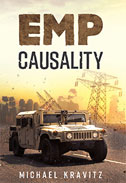
 |
Apocalyptic and post-apocalyptic novels hold a diverse range of outlooks on a changed world with survivors who persevere in its aftermath. For Kravitz’s third novel, much of the country is still reeling from the EMP (Electromagnetic pulses) strike that occurred in his first novel, Boston Darkens. The grid no longer functions, and survivors strive to maintain a semblance of normalcy as they wait for the restoration of power.
Set in the months before power is to return to the grid, his story again features the Randal family. It opens with daughter, Jessica, returning home from a dangerous travel to a Tent City with her boyfriend, Joshua. Their relationship is a burden for her father, Ben, who disapproves of the older Joshua’s romance with his teenage daughter. As Jessica desires more independence, Ben agonizes over the loss of “his pearl, the glow that surrounded his soul, the fulfillment of his life’s journey.” His wife, Alice, distances herself from him as he clings to his faith, prayerfully grappling through his conflicting emotions and his daughter’s eventual return.
When Jessica does return to the collaborative, a safe haven created by Ben, tensions are high as he shuns Joshua and further divides the family in emotional turmoil. Jessica and Joshua carry on a secretive love affair through the use of letters. Among the others in the collaborative are Camille, who grieves for the tragic death of her nephew, and William, who fears for his charge—the elderly and handicapped Fred who is in desperate need of medicine. Beyond the safety of the collaborative lies the real dangers in what Kravitz refers to as the “Wild West”—a littered landscape ruled by roving gangs and scorched by fires (bringing to mind Cormac McCarthy’s The Road).
In the second half of the novel, Kravitz shifts focus to four minor characters who embark on a risky trek westward to a Tent City in search of medicine for Fred. Accompanying him is his caretaker, William, trained policewoman Ann (wife of Officer Ryan, primary security for Ben’s collaborative), and Camille, who wants urgently to inform her sister of her son’s tragic death. Their journey is “paved with anguish and sorrow” and sends them into the ruined cities and countryside replete with friendly and unsavory people. But not all is lost as Kravitz gives his story a hopeful end.
Somewhat reminiscent of Jean Hegland’s Into the Forest, Kravitz’s tale plunges his characters into a world without power or technology—a catastrophic situation which forces them to face harsh, new realities. Noticeably absent from the novel are the type of plot and pace one typically expects in this genre. Instead, Kravitz seems more interested in examining the emotional war of his characters. The changed world is merely background, while at the forefront is the crisis of humanity. Kravitz keys into one of the most appealing premises of any post-apocalyptic story—the sheer will to survive. He seems comfortable in the world he creates, wisely avoiding gratuitous violence and paying considerable attention to his vast array of “forgotten Americans.”
His characters are all equally vulnerable and strong, dealing with their faults as they traverse a world half in ruins. He is most effective at portraying tempestuous relationships against the backdrop of a damaged society. The anguished Ben, whose wounded ego impacts his role as a leader while his own family falls apart, is a familiar element of survivalist stories (think Rick Grimes of The Walking Dead). Just as important, though, are the female characters that comprise Kravitz’s cast, particularly Ann and Camille. Yet, while they emerge as strong, heroic fighters, Jessica and Alice seem reduced to the sidelines, and one is left without a solid resolution of their storylines. The middle of the novel is primarily spent with the members of the collaborative, observing their fears, woes, and introspections. When Ann and Camille set out into the “Wild West, however, the story picks up again, bringing the reader back into the tense action that is so typical of the genre.
Kravitz’s tale carves out its own niche among the plethora of other apocalyptic and dystopian stories in modern literature. Like its companions, it offers another cautionary tale with a message of hope for humanity in a decaying world.